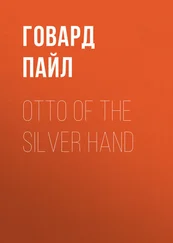Говард Пайл - Rejected of Men
Здесь есть возможность читать онлайн «Говард Пайл - Rejected of Men» — ознакомительный отрывок электронной книги совершенно бесплатно, а после прочтения отрывка купить полную версию. В некоторых случаях можно слушать аудио, скачать через торрент в формате fb2 и присутствует краткое содержание. Жанр: foreign_antique, foreign_prose, на английском языке. Описание произведения, (предисловие) а так же отзывы посетителей доступны на портале библиотеки ЛибКат.
- Название:Rejected of Men
- Автор:
- Жанр:
- Год:неизвестен
- ISBN:нет данных
- Рейтинг книги:3 / 5. Голосов: 1
-
Избранное:Добавить в избранное
- Отзывы:
-
Ваша оценка:
- 60
- 1
- 2
- 3
- 4
- 5
Rejected of Men: краткое содержание, описание и аннотация
Предлагаем к чтению аннотацию, описание, краткое содержание или предисловие (зависит от того, что написал сам автор книги «Rejected of Men»). Если вы не нашли необходимую информацию о книге — напишите в комментариях, мы постараемся отыскать её.
Rejected of Men — читать онлайн ознакомительный отрывок
Ниже представлен текст книги, разбитый по страницам. Система сохранения места последней прочитанной страницы, позволяет с удобством читать онлайн бесплатно книгу «Rejected of Men», без необходимости каждый раз заново искать на чём Вы остановились. Поставьте закладку, и сможете в любой момент перейти на страницу, на которой закончили чтение.
Интервал:
Закладка:
In his former work Dr. Caiaphas had seen much of poverty in a provincial town, and it was with him as it was with other people in the smaller cities and communities–he did not know what it meant to be poor in a great city such as the metropolis. To be poor in a small city is altogether a different thing from the dreadful poverty of the great congested communities where rents are expensive and living dear. A man may be poor in a provincial town and yet have a comfortable home. Oftentimes his home becomes squalid and barren–it becomes bare and naked and stripped of comforts as he sinks lower and lower into the quag of poverty; but he still has room in which to move about and to live, and he still has the out-of-doors close at hand in which he may walk about and breathe the pure air. But in a great city, even those who are not really of the pauper class–even those who have work to do, and make what is called a comfortable living–live crowded together and congested in black and dismal tenement houses that fairly reek with the stench of humanity packed within their walls. This is a poverty from which there is no escape, and to which there is no out-of-doors except the noisy and dirty street with its ash-barrels, its garbage, and its refuse. This is a poverty whose recreation is to sit out upon the doorstep that leads into the dirty street or upon the fire-escape, or, in hot weather, maybe upon the roofs among the chimney-stacks and a net-work of electric wires. This is a poverty that breeds harlots and criminals as corruption breeds maggots.
For all this misery Dr. Caiaphas was in nowise to blame, but, nevertheless, when he first entered into the parish, coming, as he did, fresh from a wholesome provincial community, he felt that the condition was a crime to which he himself was somehow indirectly a party. He did not see wherein the fault lay, nor yet just how he was responsible for it, but it was clear to him that it was cruelly unjust that he, who had never produced anything, who had never created anything, who spent his life in preaching to rich people who had no need for divine consolation, and who listened to his sermons for the sake of their splendid oratorical periods–interested rather in the novelty of his ideas than in their humanitarian import–it seemed to him to be cruelly unjust that he, doing such barren work as this, should enjoy forty thousand dollars a year and live so luxuriously while these poor men and women, who did actually create the real uses of the world, who were actually now adding to the wealth and the prosperity of mankind–should be packed together in greasy and stinking tenement houses like vermin in so many boxes.
Early in his life, as rector of the church, he had made one futile attempt to rectify this wrong to which he felt that he was himself helplessly party. “I cannot, gentlemen,” he said, concluding a speech to the vestry–“I cannot feel free to accept a fee of forty thousand dollars a year, besides my house, rent free, and to live in luxury under such circumstances. It is an injustice which I did not create, but in accepting such munificent rewards I make myself accessory to it. These men are equally human beings with myself, and betwixt them and myself, in the eyes of God, there is not one iota of fundamental difference. Not only have they the same desires as myself, but they, in the light of truth, are God’s children just as I am one of God’s children, and each and every one of them is the inheritor of a heavenly immortality equal to mine–a heavenly glory that shall, perhaps, exceed mine to come. Feeling this as strongly as I do, I cannot consent to be the instrument of such injustice and such inequality. I cannot consent to accept for the few trivial years of this life such great luxury and ease of living, simply for the pleasure it affords my bodily senses, while these other human beings have not even sufficient food to eat or sufficient clothes to wear. Therefore it is that I cannot accept any such fee as it is your pleasure to offer me.”
The chairman of the vestry was Mr. James Dorman-Webster, probably one of the richest men in the world. He smiled kindly as the minister concluded his address, and then he laughed. “I cannot see the force of your reasoning, doctor,” he said. “If you could strip yourself down to the barest necessities of life, and live upon a dollar and a half a day, I do not see in what way you would benefit these people whose poverty is, in ninety-nine cases out of a hundred, the result of their own improvidence. The truth is that you work as hard as the head of the nation, and I am sure you are as intelligent as he, and earn your money quite as well as he does. Why should you not have a salary equal to his, instead of less than his? The fact is, labor given and wages received have no relation whatever with each other, but are merely arbitrary quantities .” He thrust his hand into the breast-pocket of his coat as he spoke and drew out a pocket-book. Then he filled out a check and handed it to the doctor. It was for ten thousand dollars. “There, doctor,” he said, “take that and distribute it among your poor as you choose. When you find that you need more, appeal to your vestry, and if they ever refuse to give it to you, then it will be time to talk of giving up your own salary.”
It was pathetic–almost tragic–the inability of this well-meaning priest, of Levitical cast and Roman associations, to escape from under the weight of forty thousand dollars of yearly wealth that God had seen fit to lay upon his shoulders. There was no answer to be made to the practical logic of Mr. Dorman-Webster, and there was nothing to be gained by any sacrifice the rich priest could make. There was the check just donated, and there was the promise of as much more as he should ask for in reason. Dr. Caiaphas might just as well have walked down to the river and have thrown his salary into the water as to refuse to take it now. His poor would gain nothing by the refusal, and he would lose everything–even his influence over the needy of his parish–for poor people, though they resent riches, have no respect for poverty in the upper classes.
Such was Dr. Caiaphas. His was a mind of that logical, well-balanced sort to which anything like religious fanaticism or excess is, of all things, most repugnant. There was nothing so displeasing to him as religious hysteria. He was wont to say, “Does any man think that God Almighty is deaf that He needs to have prayers shouted into His ears?”
All the religious ferment attending the preaching of John the Baptist was not only distasteful to him–it was positively repulsive. It distressed him beyond measure to think that it was possible for one man like this John to so stir the nether depths of humanity that all the purity and lucidity of true faith should become turbid. It was incredible to the wise and even-minded priest that any man–be he never so poor, or ignorant, or credulous–could, in that age of light, listen to the blasphemous assertions of an insane fanatic, that God was really about to send a Son into the midst of such a turbulent and disorderly tumult. How was it possible for any human creature to conceive that the Messiah would appear in the midst of such a rabble as that gathered in the wilderness to a mad baptism? Of what use were the teachings of his twenty years of rational religion if, in a moment, his poor parishioners could so rush away from him and the pure and lucid truths of faith, trampling those truths beneath their feet like a herd of swine, in their rush to hear something that stirred their emotions and was new and startling? He had thought that the poor people in his parish were fond of him, and loved to listen to the words of wisdom he was commissioned to speak. Now he felt that they cared nothing for him, and that all the words he had spoken to them had fallen upon their minds as water falls upon the sand, leaving it as parched and barren as before.
Читать дальшеИнтервал:
Закладка:
Похожие книги на «Rejected of Men»
Представляем Вашему вниманию похожие книги на «Rejected of Men» списком для выбора. Мы отобрали схожую по названию и смыслу литературу в надежде предоставить читателям больше вариантов отыскать новые, интересные, ещё непрочитанные произведения.
Обсуждение, отзывы о книге «Rejected of Men» и просто собственные мнения читателей. Оставьте ваши комментарии, напишите, что Вы думаете о произведении, его смысле или главных героях. Укажите что конкретно понравилось, а что нет, и почему Вы так считаете.












